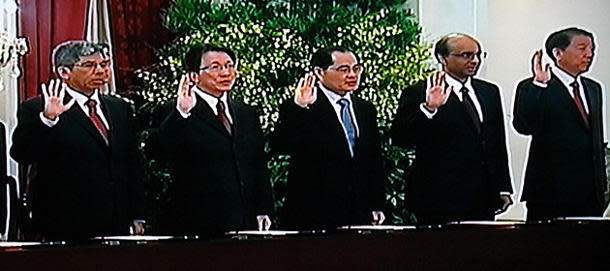‘Don’t peg ministerial pay to private sector’s’

Ministers' pay should not be pegged to the top wages in the private sector in Singapore, but rather to the salaries of government officials in other countries or to median income, said netizens.
This was one of the main messages of Yahoo! Answers users who, as of Wednesday, had posted a total of 151 comments in response to the question: "How should the new ministerial salary be calculated?"
Netizens also called for more transparency in the compensation and benefits received by the ministers and a review of the officials' pension scheme.
Ministers' pay had been a hot-button issue during the recently-concluded General Election (GE), which saw the opposition make record gains against the ruling People's Action Party.
After the election, Prime Minister Lee Hsien Loong set up a ministerial pay review committee that would recommend the compensation levels for political appointees, the PM and the President. The new salaries would be retroactive to 21 May, when the new ministers took office.
The current pay benchmark for ministers and top civil servants is set at two-thirds the median incomes of the top eight earners in each of six professions, including that of bankers and lawyers.
Global comparison
Many, however, have questioned the rationale in pegging ministerial salaries to that of the private sector.
Calling the scheme "utterly ridiculous", user Teo said, "If Obama's pay is calculated like the way we calculate our ministers' pay, how much will he be paid if the US takes Warren Buffett or Bill Gates' salaries as possible benchmarks?"
Mars agreed and said that the job of a minister is to serve the people, which is a different calling and nature to the drive for profits in the private sector.
According to Tan D, it would be fairer if Singaporean ministers' wages were benchmarked against those from developed countries by taking gross domestic product and total population into consideration.
Patrick questioned why Singapore ministers' salaries would be so much more than the ministers in countries such as Australia, Germany, Japan and South Korea which have bigger economies than Singapore's.
Prime Minister Lee Hsien Loong's annual salary is said to be in the range of $3 million whereas President Obama's current pay stands at $400,000 a year, without counting in his extra income from book sales and other activities.
Set to median income or lower
Other netizens suggested that ministers' wages be pegged to median Singaporean incomes instead, similar to the call of former NTUC Income chief Tan Kin Lian.
Big Picture argued that such a model ensured that ministers' interests were aligned with those of Singaporeans.
User Leo wanted to take it a step further and said the ministers' pay should be pegged to the 20 lowest-paid earners in Singapore so that ministers would know how much the poorest were being paid and would then have an interest in raising low incomes.
There were also calls to introduce ministerial salary scales depending on the number of years in service as a minister.
According to Jeffrey, newly-elected ministers should draw a lower pay, which would increase yearly based on the country's economic performance.
Yengchoonm suggested that all new ministers taking new portfolios should undergo a three to six months probation period, during which they earn 70 percent of their full salaries until they have proven themselves capable.
Some netizens said they would like to see a system wherein ministers would earn a basic salary but different ministers would earn extra wages that are proportionate to their responsibilities.
No to pension scheme
Many have called for the pension scheme that provides retired ministers with an annual pension equivalent to about 10 percent of their salary during government office to be abolished from ministerial pay as well.
One one user called it a "dying product of the colonial system."
Anoldsingaporean said that since all Singaporeans have been asked to be on the Central Provident Fund scheme, ministers should lead by example so that they understand the retirement needs of Singaporeans.
"If the government has already abolished the pension scheme for all civil servants, then don't award pensions to themselves or top army officials. That is double standard," said Dazzler.
Mind ur own biz reasoned that with more and more ministers retiring over time, the financial burden on the future generations of Singaporeans will balloon under the pension scheme.
Moreover, netizens wanted more transparency regarding the whole process of determining ministerial pay.
Jeffrey requested for total wage package details, inclusive of fringe benefits, to be released to Singaporeans, who have the right to know because as tax payers, "we are paying their salaries."

